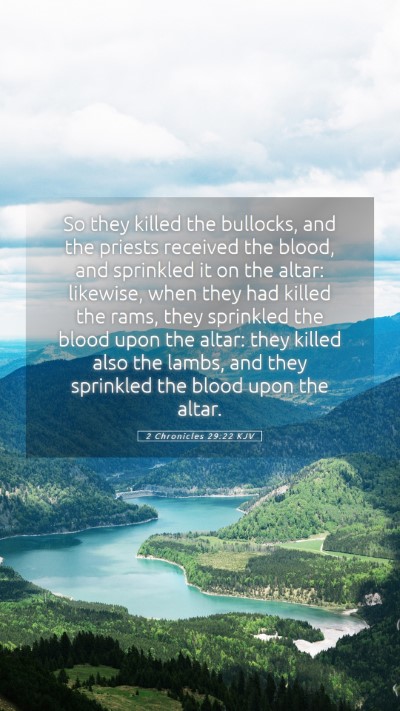Bible Verse Meaning and Commentary for 2 Chronicles 29:22
Scripture Reference: 2 Chronicles 29:22 - "So the priests killed them, and they made reconciliation with their blood upon the altar, to make an atonement for all Israel: for the king commanded that the burnt offering and the sin offering should be made for all Israel."
Introduction to 2 Chronicles 29:22
This verse occurs in a critical moment during King Hezekiah's reign in Judah, a period when the temple worship was restored. The context presents a significant revival of true worship, where the king's earnest endeavor to return Israel to the exclusive worship of Yahweh set the stage for this pivotal act of atonement.
Exegesis and Verse Analysis
According to Matthew Henry, this verse illustrates the importance of atonement in the life of Israel. The priests' action of offering sacrifices was a fulfilling of the Law and an essential step for restoring the covenant relationship between God and His people.
Albert Barnes expounds on the necessity of the sacrifices, noting that the "burnt offering" signifies dedication to God while the "sin offering" represents the seeking of forgiveness for transgressions. The duality of these offerings emphasizes both the need for sanctification and reconciliation.
Adam Clarke highlights the significance of the phrase "for all Israel." He points out that while individual sins may have been prevalent, God required corporate repentance and atonement for the nation as a whole, encapsulating the belief in collective responsibility for sin and the communal benefits of atonement.
Theological Insights
- Atonement and Reconciliation: The act of making atonement through blood sacrifices is central to understanding God's design for dealing with sin.
- The Role of Priests: This text emphasizes the crucial role of priests as mediators between God and the people, serving as conduits for divine reconciliation.
- Corporate Worship: The need for collective sacrifice underlines the principle of community in worship and the importance of restoring not just the individual but the entire nation before God.
Implications for Today
This verse transcends its historical context, providing insights for contemporary believers. It reminds us that our worship and approach to God must include acknowledgment of sin and a sincere effort towards atonement, embodying both personal and communal dimensions.
How to Apply This Verse
- Practice Confession: Regularly confess communal and personal sins in prayer, recognizing the importance of restorative actions.
- Participate in Worship: Engage actively in church practices that acknowledge atonement and seek to restore relationships within the community.
- Study Atonement: Explore the concept of atonement throughout Scripture to understand its depth and implications for faith.
Related Cross References
- Leviticus 4:20 - Importance and procedures of sin offerings.
- Hebrews 9:22 - The necessity of blood for atonement.
- Psalm 51:17 - God desires a broken spirit and repentant heart.
Conclusion
2 Chronicles 29:22 serves as a rich source of insights regarding the nature of atonement, communal worship, and the role of leadership in spiritual restoration. By understanding this scripture deeply, we enhance our Bible verse understanding, embrace its teachings in our Bible study groups, and apply its principles to our daily lives.
For those involved in online Bible study, this verse highlights how the ancient practices of Israel point towards the greater atonement fulfilled in Christ, fostering an enriching dialogue on living out our faith in a meaningful way.
Further Study Resources
- Bible Study Lessons: Engage in lessons that explore the themes of sin, atonement, and sacrifice.
- Bible Study Guides: Utilize resources that explicate Old Testament practices of worship and their significance today.
- Bible Study Materials: Access theological texts that discuss the nature of atonement both in the Old and New Testaments.


